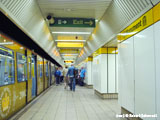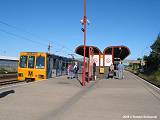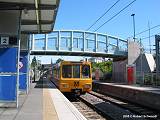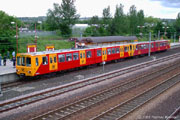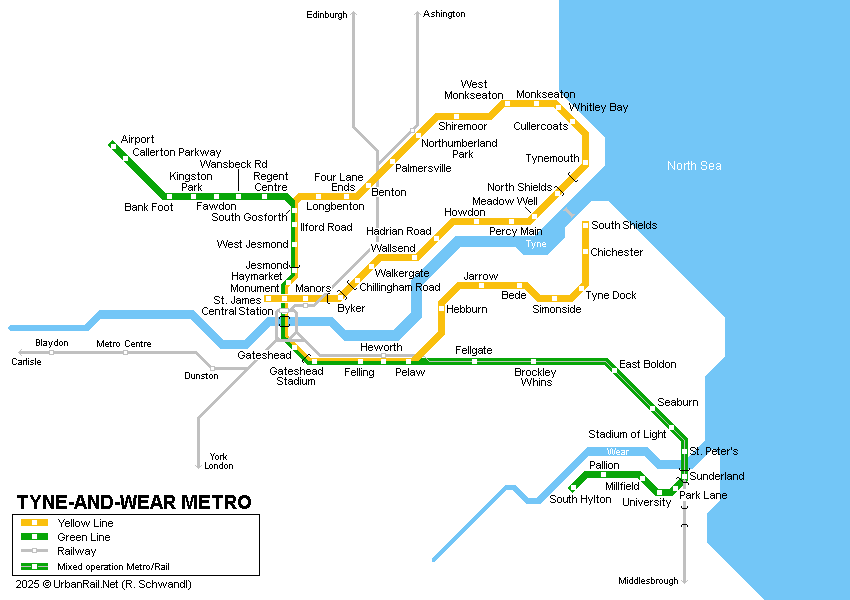
| System | ||
|
The TYNE AND WEAR METRO system (77.5 km) is not a 'full metro' because of some level crossings, four along the branch to the Airport, one at Howdon, and three on the Sunderland line. Also, the Sunderland branch shares tracks with regional diesel train services. Today's network was developed by converting 45 km of British Rail lines (some in use, some abandoned). Some 13 km of newly built track were added to this, including a 6.1 km long underground section (single track tube tunnels) in central Newcastle and Gateshead. The river Tyne is crossed on a purpose-built bridge. On the original network, there are also short tunnels between Tynemouth and North Shields and between Chillingham Road and Byker. At Howdon, Fawdon and Kingston Park, platforms are staggered, with a level crossing in between. From Pelaw an extension was built to Sunderland, with Metro trains sharing tracks (14 km, upgraded with 3 new stations) from Pelaw to Sunderland with local trains run by Northern Rail. From Sunderland to South Hylton new track (4.5 km) was laid along a long dismantled railway alignment. Transfer between Metro and regional services is provided at Sunderland, Heworth and Newcastle Central Station. The Tyne and Wear Metro is one of only a few metros in the world where one train comes through the same station twice, which is the case at Monument. Yellow Line trains start underground at St. James next to the huge football stadium. They run through the upper level at Monument and leave the city tunnel just after Manors station. After running the loop along the coast they come back into the north-south tunnel just before Jesmond, and run through Monument station on the lower level. After Central Station they come to the surface to cross the river Tyne on a bridge. Immediately after that, they disappear again to reach the last underground station at Gateshead. After this station they leave the tunnel and join the original railway alignment to Heworth and Pelaw. Until 11 Dec 2005, when the southern legs were swapped, Yellow Line trains used to continue to South Hylton, and Green Line trains from the Airport ran to South Shields (Green Line). A trip from St. James to Monument via the coastal loop takes 54 minutes, trains continue for another 28 minutes to South Shields. Green Line trains take 67 minutes from the Airport to South Hylton.
|
||
| Photos | ||
|
|
||
| History | ||
|
11
Aug 1980 - Haymarket - Monkseaton - Tynemouth |
||
|
|
||
| Links | ||
|
NEXUS - Metro operator - (official) Tyne and Wear Metro at Wikipedia Simon Billis' report & photos at nycsubway.org |
||
| Photos | ||
| Books | ||
|
||

 Newcastle
is the centre of the metropolitan county of Tyne and Wear which includes
other towns like Gateshead, Sunderland or South Shields. The city itself
has only some 300,000 inhabitants but the area served by the Tyne and
Wear Metro has about a million. Newcastle is a major port and an industrial
centre in the north-east of England.
Newcastle
is the centre of the metropolitan county of Tyne and Wear which includes
other towns like Gateshead, Sunderland or South Shields. The city itself
has only some 300,000 inhabitants but the area served by the Tyne and
Wear Metro has about a million. Newcastle is a major port and an industrial
centre in the north-east of England.











